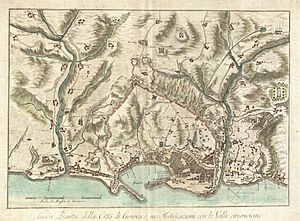Siege of Genoa (1800) facts for kids
Quick facts for kids Siege of Genoa |
|||||||
|---|---|---|---|---|---|---|---|
| Part of the War of the Second Coalition | |||||||
 Plan of the city of Genoa, and its fortifications with the surrounding valleys in 1800 |
|||||||
|
|||||||
| Belligerents | |||||||
| Commanders and leaders | |||||||
|
|||||||
| Strength | |||||||
| 18,000 | 40,000 1 British naval squadron |
||||||
| Casualties and losses | |||||||
| 11,000 total | 17,000 total | ||||||
The Siege of Genoa was a major military event that happened from April 6 to June 4, 1800. During this time, the country of Austria surrounded and captured the city of Genoa from France. This happened during a big conflict called the War of the Second Coalition.
Even though France lost Genoa, this siege was actually a smart move by the French general André Masséna. His army kept the Austrian forces busy. This allowed Napoleon to win a very important battle later, called the Battle of Marengo. Sadly, during the siege, about 30,000 people in Genoa died from hunger and sickness.
Why the Siege Happened
After a French victory in the Second Battle of Zurich, the alliance between Russia and Austria ended. This was a big change in the war. Soon after, Napoleon returned from Egypt and became the leader of France, called the First Consul. This made France much stronger.
However, Napoleon needed time to move his soldiers into Italy. So, he told General Masséna to hold onto the cities of Nice and Genoa no matter what. Masséna had to keep these cities safe until Napoleon arrived.
The Start of the Siege
At first, the French army had about 60,000 soldiers. But many got sick with a disease called typhus. This reduced their fighting force to about 36,000 men. Two French generals had even died from typhus before Masséna took command.
The Austrian commander, Michael von Melas, had a much larger army of about 120,000 soldiers in Italy. After some early fights, Genoa was completely cut off. The French soldiers, led by brave generals like Louis-Gabriel Suchet and Jean-de-Dieu Soult, fought hard. But by April 6, the city was surrounded by land and by sea. A strong British navy squadron had taken positions around the port.
Even with this, the French soldiers felt hopeful. Masséna was determined to defend Genoa.
Fighting During the Siege
Genoa was naturally protected by mountains and had strong forts. But Masséna decided to attack instead of just defending. On April 7, he ordered an attack on a place called Monte Ratti. The French pushed the Austrians out of the Apennine Mountains and captured about 1,500 enemy soldiers.
Two days later, Masséna tried a risky plan to meet up with other French forces. He had only 1,200 soldiers against 10,000 Austrians. But he held strong and, with help from Soult, captured another 4,000 Austrian prisoners. After this, the French army finally stayed inside the city walls.
Many fierce battles followed, especially for Fort Quezzi and Fort Richelieu. These fights caused many losses for the Austrians. The French then captured Mount Creto, which made the Austrians stop their attacks for a while.
Meanwhile, Napoleon was marching with his army, but not directly to Genoa. He went to Milan first. By the end of May, a terrible sickness had spread through Genoa. The people living in the city were very upset and wanted to give up. Talks began in early June to exchange prisoners. The citizens and some soldiers wanted to surrender.
Masséna did not know that the Austrian general, Peter Ott, had been told to stop the siege. This was because Napoleon had crossed the Great St Bernard Pass and was now a threat to the main Austrian army. General Ott asked for and received permission to keep the siege going.
On June 4, Masséna's negotiator finally agreed to let the French army leave Genoa. But Masséna made it clear: if anyone used the word "surrender," he would stop all talks.
Two days later, some French soldiers left by sea. But most of Masséna's hungry and tired troops marched out of the city. They took all their equipment and followed the road along the coast towards France. This ended one of the most amazing sieges in modern history. Masséna showed great toughness, cleverness, courage, and daring. This earned him much praise, putting him in the same league as Napoleon.
What Happened Next
The difficult siege lasted about sixty days. But it was very important for Napoleon's plan. By forcing the Austrians to use so many soldiers at Genoa, Masséna made it possible for Napoleon to cross the Great St Bernard Pass. Napoleon then surprised the Austrians and defeated General Melas's army at Marengo. This happened before the Austrians could send more soldiers from Genoa to help.
Less than three weeks after the French left Genoa, Napoleon wrote to Masséna. He told him, "I cannot show you greater trust than by giving you command of the first army of the Republic." The Austrians also understood how important Masséna's defense was. The Austrian chief of staff said, "You won the battle, not in front of Alessandria but in front of Genoa."
 | Laphonza Butler |
 | Daisy Bates |
 | Elizabeth Piper Ensley |

